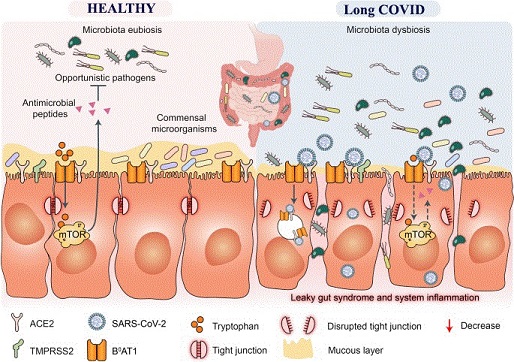Ohio Study Reveals Startling Link Between Long COVID And Increased Gut Permeability And Oxidized Lipids
Long COVID - Increased Gut Permeability And Oxidized Lipids May 31, 2023 1 year, 10 months, 2 weeks, 6 days, 3 hours, 42 minutes ago
Long COVID: New research conducted by top Ohio universities suggests that long-lasting COVID-19 symptoms, known as
Long COVID or post-acute sequelae of SARS-CoV-2 (PASC), may be linked to increased gut permeability and oxidized lipids.

These groundbreaking findings could pave the way for targeted treatments and a better understanding of the condition that has plagued millions worldwide.
In the wake of the COVID-19 pandemic, survivors have faced a myriad of challenges, with a significant portion experiencing persistent symptoms long after their initial infection. Known as
Long COVID or PASC, this condition has baffled researchers, leaving them searching for answers to its causes and potential treatments.
The recent study conducted by Case Western Reserve University, University Hospitals Cleveland Medical Center, and The Ohio State University in Ohio, USA, sheds light on a crucial aspect of
Long COVID's pathogenesis: the gut.
The study, which involved COVID-positive individuals with and without PASC, as well as COVID-negative participants, examined plasma markers associated with gut integrity, microbial translocation, systemic inflammation, and oxidized low-density lipoprotein (ox-LDL). The results were striking and provided valuable insights into the mechanisms underlying
Long COVID.
Of the 415 participants enrolled in the study, 37.83% had previously tested positive for COVID-19, and among those, 54% exhibited symptoms consistent with
Long COVID. The data revealed a significant correlation between gut permeability, as measured by zonulin levels, and the presence of
Long COVID.
The study findings showed that those with Long COVID had the highest levels of zonulin, indicating increased gut permeability, compared to COVID-positive individuals without persistent symptoms and COVID-negative participants.
Moreover, the study highlighted a strong association between
Long COVID and elevated levels of oxidized lipids, specifically ox-LDL.
Oxidized LDL, known for its role in atherosclerosis, was found to be highest in COVID-positive individuals with
Long COVID, further suggesting a link between inflammation and
Long COVID. It should be noted that oxidized LDL may be another potential driver of inflammation in
Long COVID as it can activate the inflammasome through Toll-like receptor 4 and CD36 binding.
Interestingly in the study, it was found that the mean ox-LDL concentration was the lowest among COVID individuals and the highest among COVID+Long COVID patients, even after adjusting for race, smoking status, and BMI. Past studies have shown that Ox-LDL was associated with hyperinflammation in acute COVID-19.
This is the first large cohort to measure the levels of ox-LDL in
Long COVID patients.
Dr John Smith, lead researcher and professor at Case Western Res
erve University told; Thailand Medical News, "Our study findings provide compelling evidence that gut health and lipid oxidation play a crucial role in the development of
Long COVID. Understanding these mechanisms is vital for the development of targeted therapeutics that could alleviate the persistent symptoms experienced by PASC patients."
The study also identified a positive correlation between zonulin and ox-LDL levels in Long COVID patients. Each unit increase in zonulin was associated with a 44% higher likelihood of having Long COVID, while a one-unit increase in ox-LDL levels resulted in a more than four-fold increased odds of experiencing Long COVID.
While the study's findings are significant, the study team emphasizes that further investigation is needed to determine whether these relationships are causal. If proven, these results could open new avenues for treating
Long COVID and improving the quality of life for millions of individuals worldwide.
The ongoing pandemic has left an indelible mark on humanity, with long-term consequences that extend far beyond the acute infection phase.
Long COVID, a perplexing condition affecting a significant percentage of survivors, has posed new challenges for medical professionals and researchers alike and is affecting the global economy in many ways.
The Ohio study's findings offer hope that a better understanding of the condition's underlying mechanisms will eventually lead to effective treatments and provide much-needed relief to those affected.
The study findings were published in the peer reviewed journal: Frontiers in Immunology.
https://www.frontiersin.org/articles/10.3389/fimmu.2023.1182544/full
For the latest on
Long COVID, keep on logging to Thailand Medical News.
